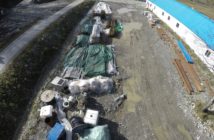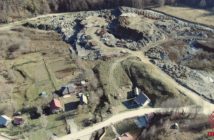Podgorica, 16 October 2010 – The reaction of the Ministry of Economy to the comments submitted by MANS – concerning the government’s plans to build a series of dams and hydropower stations along the Morača river – have shown that the fate of this project has already been determined. The decision seems to have already been made, even though public hearings on the matter have only just ended and it is unlikely that the authorities had enough time to review all the comments they received. The public hearings were, once again, marked by a serious lack of transparency and by the efforts of the plan’s drafters to sell it as being in the interests of all citizens rather than those of the eventual concession-holder.
This is a scenario that has already played itself out during the public consultations that were held in discussions preceding the draft of the master-plan and the environmental impact study prepared for the hydropower stations along the Morača river. At that time, the government promised that the project would lead to the creation of tens-of-thousands of new jobs, the development of new tourism and agricultural branches, the halting of resident emigration and who knows what else!
The goal then, as it is now, was to hide the fact that the greatest benefits from this project will be reaped by the future concession-holder and domestic tycoons in the construction-industry. Information that would demonstrate the benefits from “leasing” a good part of northern Montenegro’s resources are still being kept secret. Instead, the entire basis of the government’s argument in favor of the hydropower stations is built on “allegations, assurances and promises” that “all this will be good” for the Montenegrin economy.
This type of government behavior, with ministers Branimir Gvozdenović and Branko Vujović at the forefront, lacks credibility. It is also irresponsible, given the fact that this is a project that aims to permanently alter the ecological state of Montenegro’s north.
In the absence of serious economic analysis, it is hard to take Gvozdenović and Vujović at their word when it comes to any discussion of electrical energy and economic developments related to it. This is primarily due to the fact that thanks to the economic policy of the government, and due to these two gentlemen, the citizens of Montenegro have for years been paying electricity subsidies to private companies whose true owners are hiding behind offshore companies.
Gvozdenović and Vujović were directly or indirectly involved in a series of privatizations that seriously undermined Montenegro’s energy sector, as they did with the aluminum and iron/steel industries before that. This makes the domestic public’s reservations about newly proposed projects more understandable, given that usually when Gvozdenović and Vujović say that something “will be good for the citizens of Montenegro and the national economy,” the opposite tends to happen.
Yet taking the government at its word is exactly what they are once again asking that the Montenegrin public does, having in mind that the real reasons for the megalomaniacal building of dams on the Morača river are still not being publicly disclosed by the most important institutions in the state.
Even the small amount of information that is being released is contradictory and cannot replace more accurate and precise data. In the responsible ministries, the claim is being made that the main reason for building these dams is to meet the electricity deficit of this country.
Yet, they then go on to announce that there are no guarantees that a Montenegrin citizen will be able to buy electricity from domestic sources since in 2015 the regional energy market will be liberalized and we’ll all be able to purchase electricity from any source. Why then submerge the Morača canyon if the energy balance at the state level will not depend on domestic energy production and imports will be considered the individual choice of every consumer?
The second serious fallacy being wielded by the responsible ministries concerns the alleged economic benefits that will accrue to the country as a result of building the dams; including the already notorious promises of ’employment’ that will eradicate poverty in Montenegro. We’ve already had the opportunity to see what this really looks like during the ‘golden years’ of the domestic construction-industry – when the majority of labour-was imported from surrounding countries (mostly undocumented workers). As a result, construction – as the ‘locomotive’ of Montenegro’s economic development – brought economic benefits only to a small number of domestic and foreign tycoons in the industry.
Only those who actually believe that the largest privatized companies – like the Niksić Steel and Ironworks (Željezara) or the Podgorica Aluminum Combine (KAP) – are regularly meeting their debt-obligations, will believe that the taxes, fees and other obligations related to the Morača river project will help replenish the state budget. It’s the same with the associated environmental initiatives, investment programs, etc. – the list is endless – that are supposed to come with such investments.
When we hear such talk from Gvozdenović and Vujović, who have already brought us so much ‘happiness’ with their ‘deals of the century,’ ‘successful’ privatizations and ‘strategic’ partners, the public’s anxiety becomes more readily understandable.
What is indisputable is that the process of preparing an energy evaluation for the Morača river project is occuring under suspicious circumstances, in direct violation of the procedures prescribed by the Law on Concessions and accompanied by a serious lack of transparency.
MANS takes this opportunity to once again call on the relevant ministries to stop with its attempts to feign the appearance of public participation in this process. The public hearings to date have not provided the most basic information allowing a proper evaluation of the project and have been used instead to simply satisfy legal formalities. Instead, we are calling on the government to publicly release, as soon as possible, its precise calculations of what the exact benefits will be for Montenegro’s citizens of entering into this project.
Dejan Milovac
Director, MANS’ Urbanism Program



